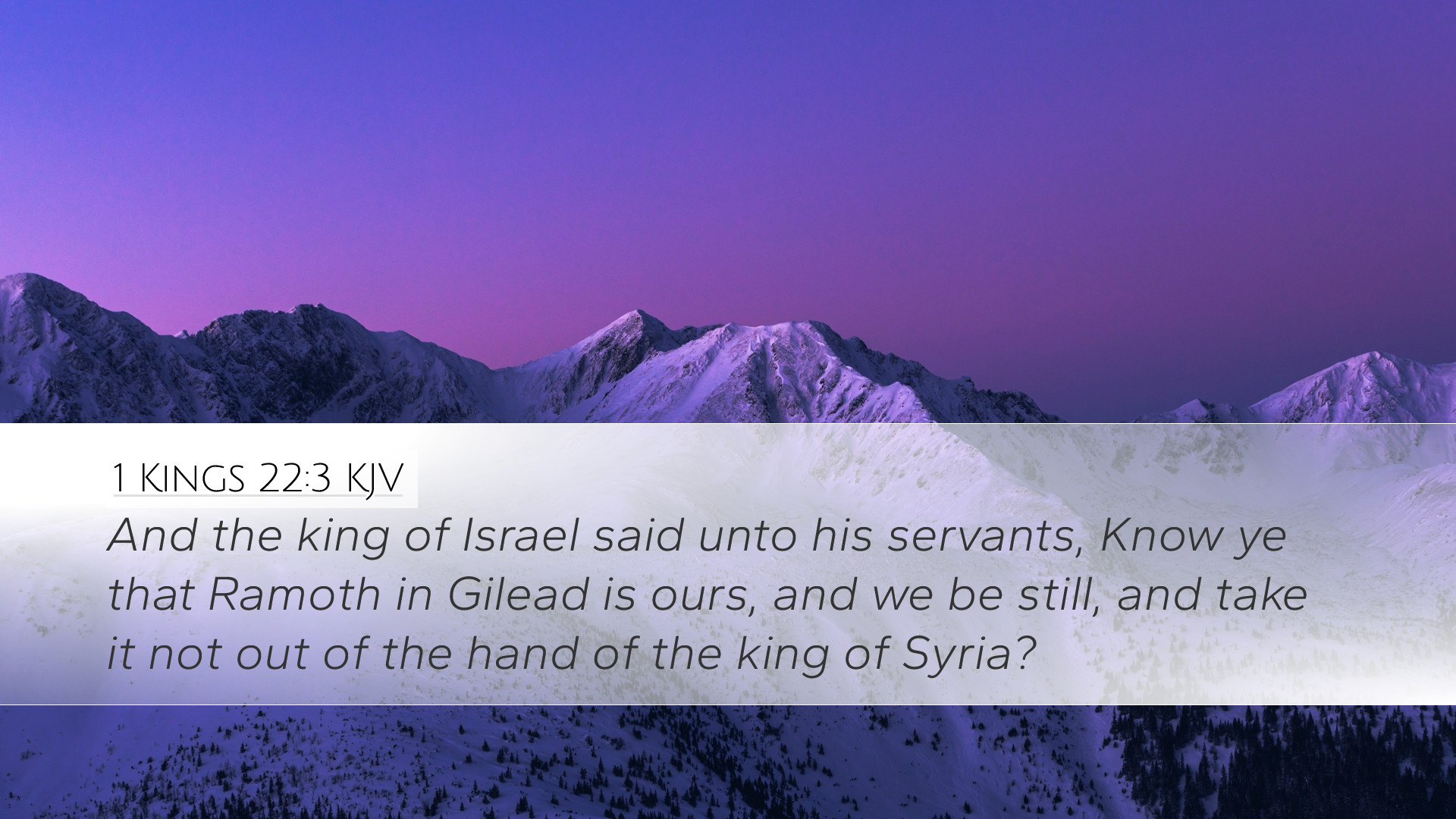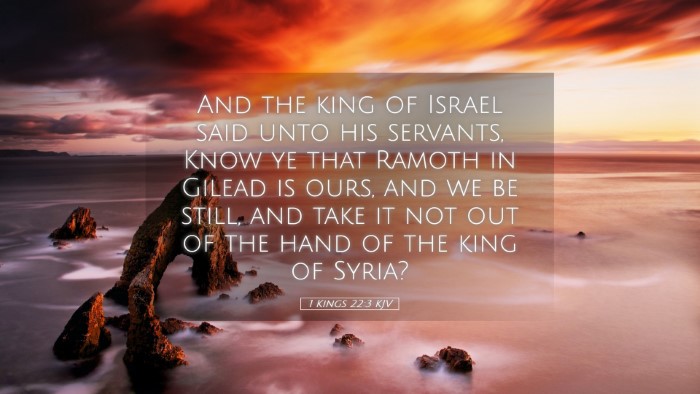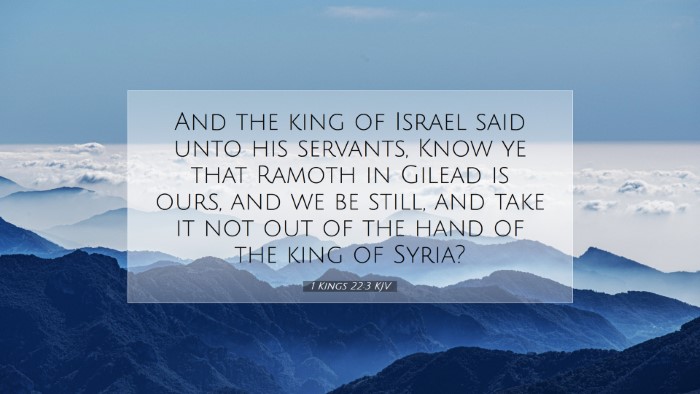Commentary on 1 Kings 22:3
Verse: "And the king of Israel said unto his servants, Know ye that Ramoth in Gilead is ours, and we be still, and take it not out of the hand of the king of Syria?"
Introduction
The account in 1 Kings 22:3 provides a critical insight into the political and spiritual climate of Israel during the reign of King Ahab. The passage reveals the dynamics between Israel and Syria, the ongoing conflict over territories, and the role of prophetic counsel amidst national decisions. This commentary synthesizes insights from prominent theologians and biblical commentaries to promote a deeper understanding of this specific verse and its implications.
Contextual Background
The narrative unfolds as Ahab, the king of Israel, is pondering military action regarding Ramoth in Gilead, a city previously belonging to Israel but under the control of Syria. The passage highlights Ahab's awareness of the city’s importance and indicates a moment of strategic decision-making. Understanding the historical context of this conflict is essential for interpreting the significance of this verse.
Historical Significance
- Territorial Conflicts: Ramoth in Gilead was a significant military stronghold due to its strategic location. Control over this region was crucial for both Israel and Syria.
- Political Climate: The era was marked by political maneuvering and the influence of external powers, reflecting a time of turmoil and the search for dominance.
Theological Insights
This passage draws attention to several theological themes, particularly the sovereignty of God in the affairs of nations, the importance of divine guidance in leadership, and the element of covenant fidelity among the people of Israel.
The Sovereignty of God
Both Matthew Henry and Albert Barnes emphasize that God's providence oversees the political events of nations. Ahab’s acknowledgment of Ramoth as being rightfully Israel's can be seen as an implicit recognition of divine promise and prophetic word.
The Role of Prophetic Counsel
The inquiry about whether to pursue Ramoth in Gilead is met with reflection on prophetic guidance. Ahab's next steps - seeking the counsel of prophets - reveal the importance of seeking God’s will before acting.
Covenant Fidelity
This verse also reflects Israel's struggle to remain faithful to their covenant with God. Ahab's desire to reclaim Ramoth underscores a longing to restore national and religious identity, albeit through questionable means.
Commentary from Theologians
Matthew Henry’s Commentary
Henry notes that Ahab's statement reveals a sense of passivity ("we be still") that characterizes his reign. He highlights Ahab’s desire to recover what rightfully belongs to Israel but critiques his approach. There is an implication that Ahab’s reliance on mere military might without consulting God leads to disastrous consequences in the narrative.
Albert Barnes’ Analysis
Barnes expands on the political implications of Ahab’s statement by emphasizing the urgency of action. He points out that in Ahab's inquiry, there is both a recognition of Israel’s loss and a desire for reclamation that lacks spiritual discernment. Barnes also comments on Ahab’s leadership failures as a source of the nation's vulnerability.
Adam Clarke’s Commentary
Adam Clarke delves into the geographic and historical significance of Ramoth in Gilead. He articulates the spiritual undertones of Israel seeking earthly possessions while neglecting their relationship with God. Clarke warns against the dangers of pursuing worldly gains at the cost of spiritual neglect, a caution that resonates throughout Scripture.
Practical Applications
The reflections from 1 Kings 22:3 offer practical lessons for contemporary readers, particularly leaders, pastors, and theologians:
- Seek Divine Guidance: Before making decisions, especially those with national or communal implications, individuals and leaders should earnestly seek God’s direction through prayer and counsel from wise advisors.
- Recognize God’s Sovereignty: Acknowledge that God governs the affairs of men, and His plans often surpass human understanding and intentions.
- Covenantal Responsibility: Understand that the call to act as God’s people involves both reclaiming responsibilities toward community and being faithful to His decrees.
- Discernment in Leadership: Leaders must be cautious of mere ambition. Trusting in God’s wisdom is paramount for ensuring the well-being of those they lead.
Conclusion
The insights drawn from 1 Kings 22:3 illuminate critical themes that are applicable for both ancient and modern readers. The verse serves as a reminder of the essential role of divine consultation in leadership and national decisions, alongside a deeper understanding of God’s sovereignty amidst human actions. As both scholars and students of the Word, there remains a profound call to engage in righteous pursuit, aligning personal and collective ambitions with God’s greater purpose.


